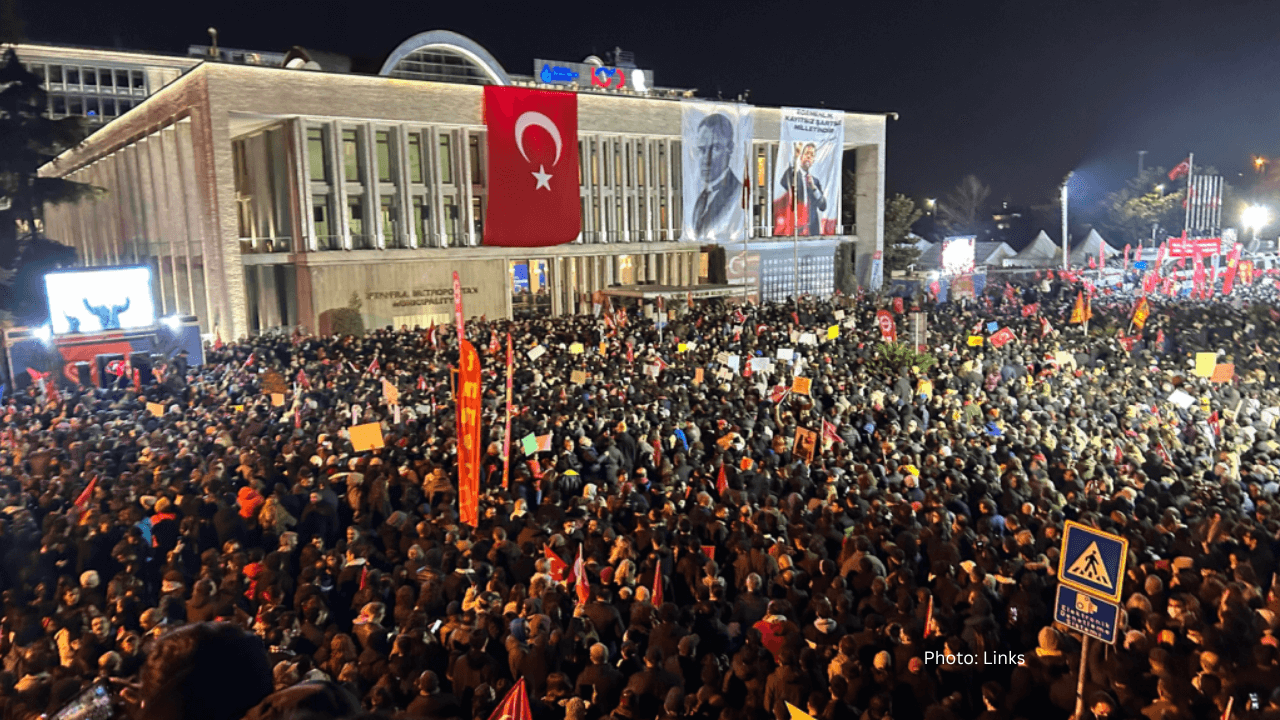Contest Between State Power and Civic Mobilization in Contemporary Turkey
Roman Uddin | 20 April 2025
Since ascending to national prominence in the early 2000s, Recep Tayyip Erdogan has shaped Turkish politics with a combination of populist conservatism, economic pragmatism, and assertive foreign policy. Under the Justice and Development Party (AKP), Erdogan reoriented Turkey away from its rigidly secular Kemalist legacy, reintroducing Islamic discourse into public life, expanding infrastructure, and positioning himself as a modern defender of Muslim identity. His supporters have often likened him to a potential revivalist of Islamic leadership reminiscent of the Ottoman era, seeing in him a visionary who could fill the vacuum of leadership in the Muslim world after decades of fragmentation. Domestically, Erdogan consolidated power through successive electoral victories, transforming Turkey’s parliamentary democracy into an executive presidency in 2017, and cultivating an image of a leader safeguarding national sovereignty and Islamic heritage. Internationally, he sought to elevate Turkey’s status as a central voice in the Muslim world, at times clashing with Saudi Arabia, notably after the Jamal Khashoggi affair, and pushing a narrative that challenged the Gulf-dominated leadership of the Organization of Islamic Cooperation (OIC).
However, by April 2025, Erdogan’s long grip on power is facing its most formidable and unpredictable challenge. The arrest of Istanbul’s Mayor EkremImamoglu on March 19, on charges widely perceived as politically motivated, has ignited a wave of protests unlike any seen since the 2013 Gezi Park movement. What differentiates the 2025 protests is their cross-demographic nature and national reach. Students, teachers, opposition party members, and even former Erdogan supporters have rallied under a shared concern over democratic erosion. The protests are not merely reactive; they are proactive assertions of civil agency against an entrenched power structure. Unlike earlier protests, these are not restricted to secular or urban elite groups. The discontent includes conservative and religious communities disillusioned by economic instability, increased censorship, and perceptions of cronyism within the AKP regime. The rhetoric has shifted from opposition to specific policies toward a more existential critique of Erdogan’s leadership itself, suggesting a broader crisis of legitimacy.
Erdogan has survived previous challenges to his authority, most notably the 2016 coup attempt. That episode, in which a faction of the military tried to topple the government, ended in failure but served to justify a far-reaching crackdown. Tens of thousands were arrested, purged, or blacklisted in the aftermath. The coup, framed as a betrayal of the nation, rallied both Erdogan’s base and undecided citizens to his side. Similarly, the 2013 Gezi Park protests, while symbolically potent, failed to achieve structural change and were eventually suppressed through state force and media control. However, the 2025 movement is substantively different: it has a clearer political catalyst in Imamoglu’s arrest, broader social participation, and a more focused articulation of democratic demands. Moreover, the opposition, particularly the Republican People's Party (CHP), has for the first time coalesced around a viable leadership alternative in Imamoglu, further destabilizing Erdogan’s dominant narrative of being without credible rivals.
The implications of this domestic crisis extend far beyond Turkey’s borders. April 2025 also saw renewed tensions between Pakistan and India, following a deadly attack in Kashmir. Erdogan’s vocal support for Pakistan, including statements lauding Islamabad’s “restraint” and reaffirming Turkey’s strategic partnership, triggered diplomatic backlash from India. His position, framed as solidarity with a fellow Muslim-majority country, intensified calls within India to boycott Turkish goods and services, harming bilateral economic ties. Simultaneously, these developments unfolded against a backdrop of global instability. In the United States, Donald Trump’s administration, returning to power in January, has largely remained inward-focused, prioritizing domestic security and economic nationalism. Trump’s historically warm ties with Saudi Arabia continue, contrasting sharply with Erdogan’s strained relationship with Riyadh. This geopolitical divergence has splintered the coherence of Muslim leadership in international forums like the OIC, as Erdogan positions Turkey as an alternative to Gulf-dominated politics, fueling further polarizations within the Islamic world.
Erdogan’s recent actions and the ensuing public response reflect a critical juncture in Turkey’s evolving democratic landscape and its regional role. As the protests continue to gain momentum, they underscore a dynamic political environment marked by civic engagement and a maturing public discourse. Should this unrest translate into greater electoral competitiveness, it may open avenues for institutional renewal and pluralism within Turkey’s democratic framework. Conversely, if the government opts for a more assertive approach to restore order and stability, it would reflect Ankara’s prioritization of national unity and continuity during a turbulent period. While such measures could raise concerns about political openness, they may also be viewed by some as necessary responses to complex internal and external pressures. Economically, challenges persist, reflected in currency fluctuations and cautious investor sentiment, but these are not uncommon in transitional phases of political recalibration. In navigating this period, Turkey’s resilience and strategic significance remain pivotal to both regional diplomacy and broader global dynamics.
Turkey stands at a pivotal moment. Erdogan’s legacy as a transformative but divisive leader is now being challenged in ways unprecedented during his two-decade rule. The current protests, unlike past movements, present a comprehensive indictment of the system he has built, one that combines ideological rigidity with economic centralization and personalized governance. Whether this challenge will produce democratic reform or deeper authoritarian entrenchment remains uncertain. What is clear is that the outcome will reshape not only Turkish politics but potentially the broader configuration of power and identity across the Muslim world.
Roman Uddin is a Research Associate at CGS
Views in this article are author’s own and do not necessarily reflect CGS policy.
